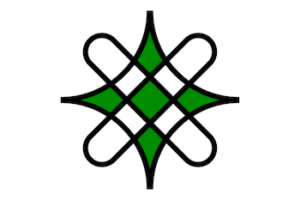
The Hausa Community Flag
*The Hausa community is celebrated on this date in 1000. The Hausa are the largest ethnic group in sub-Saharan Africa, with the second most spoken language after Arabic in the Afro-Asiatic language family.
The Hausa are a diverse but culturally homogeneous people, primarily based in the Sahelian and sparse savanna areas of southern Niger and northern Nigeria. Over 80 million people, with significant indigenous populations in Benin, Cameroon, Ivory Coast, Chad, Sudan, Central African Republic, Republic of the Congo, Togo, Ghana, Eritrea, Equatorial Guinea, Gabon, Senegal, and The Gambia. Predominantly Hausa-speaking communities are found throughout West Africa and along the traditional Hajj route to the north and east, traversing the Sahara.
Other Hausa have also migrated to large coastal cities, such as Lagos, Port Harcourt, Accra, Abidjan, Banjul, Cotonou, and parts of North Africa, including Libya. The Hausa traditionally live in small villages and pre-colonial towns and cities where they grow crops, raise cattle, and trade locally and across Africa. They speak the Hausa language, a member of the Afro-Asiatic Chadic group. The Hausa aristocracy had historically developed an equestrian-based culture. A status symbol of the traditional nobility in Hausa society, the horse remains a prominent feature in Eid celebrations. It is called Ranar Sallah (in English: The Day of the Prayer).
Daura city is the cultural center of the Hausa people. The town predates all the other major Hausa towns in tradition and culture. Over the last 500 years, the Hausa have crisscrossed the vast African landscape in all its four corners for various reasons. They range from military service, long-distance trade, hunting, performing the Hajj, fleeing oppressive Hausa feudal kings, and spreading Islam. The table below shows the distribution of the Hausa ethnic population by country of indigenization outside of Nigeria and Niger. Daura, in northern Nigeria, is the oldest city of Hausaland.
The Hausa of Gobir, also in northern Nigeria, speak the oldest surviving classical vocabulary of the language. Historically, Katsina was the center of Hausa Islamic scholarship, but now it is being replaced by Sokoto, stemming from the 18th-century Islamic reform of Usman Dan Fodio. The Hausa are culturally and historically closest to other Sahelian ethnic groups, primarily the Fula, Zarma, Songhai, Bambara, and Dosso. Since pre-colonial times, the Hausa Language has also been translated into a modified Arabic script known as Ajami. The earliest Hausa Ajami manuscript with a reliable date is the Ruwayar Annabi Musa, written by the Kano scholar Abdullah Suka, who lived in the 16th century.
This manuscript is in the collection of the Jos Museum. Other well-known scholars and saints of the Sufi order from Katsina, Danmarna, and Danmasani have been composing Ajami and Arabic poetry since the 1600s. Gradually, many Hausa Ajami manuscripts were written, their volume increasing through the Eighteenth and Nineteenth Centuries and continuing into the twentieth. With the Nineteenth Century witnessing even more impetus due to the Usman dan Fodio Islamic reform, a copious writer who encouraged literacy and scholarship for both men and women, several of his daughters emerged as scholars and writers.
Romanized Hausa, or Boko, publishing has surpassed Ajami book publishing in terms of volume today. A modern literary movement led by female Hausa writers emerged since the late 1980s, when writer Balaraba Ramat Yakubu gained popularity. In time, the writers spurred a unique genre known as Kano market literature — so named because the books are often self-published and sold in the markets of Nigeria. The provocative nature of these novels, which are typically romantic and family dramas that are otherwise rare in the Hausa tradition and lifestyle, has made them popular, especially among female readers. The genre is littattafan soyayya, or “love literature.”